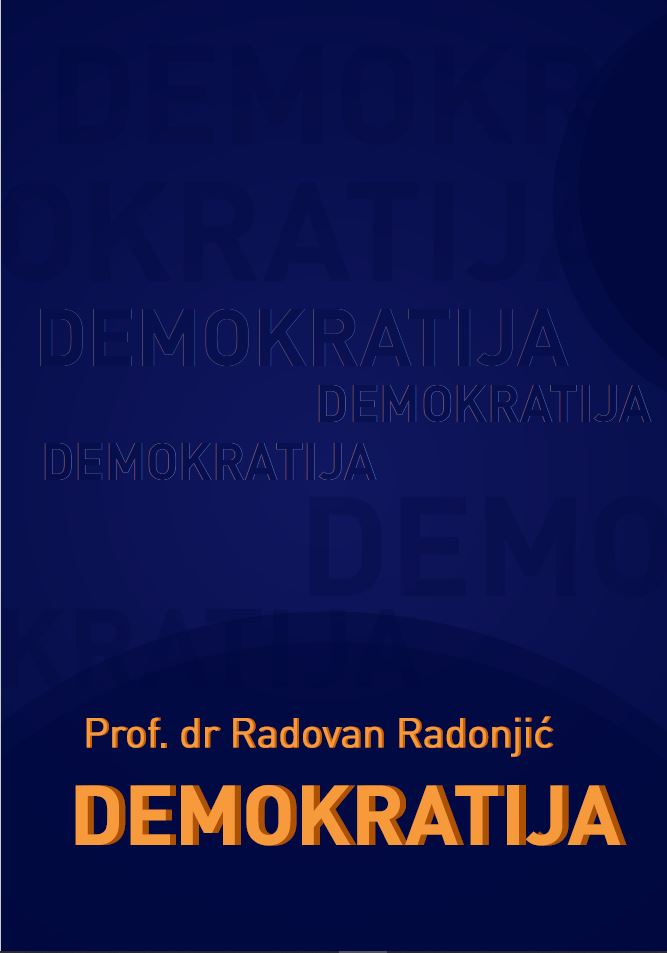Demokratija
Democracy
Author(s): Radovan Radonjić
Contributor(s): Daliborka Uljarević (Editor), Maja Mugoša (Translator)
Subject(s): Politics, Human Rights and Humanitarian Law, Civil Society, Governance, Government/Political systems
Published by: Centar za građansko obrazovanje (CGO)
Keywords: political systems; democracy; citizen; civil society; human rights; majority; political parties; governance;
Summary/Abstract: This book is intended for the students and young intellectuals. Its aim is to serve as a manual for acquiring adequate theoretical knowledge on democracy; that is for acquaintance with the principles and contents of implementing the idea of democracy in various areas of social life. In accordance with the principle of education the book has two attributes. One attribute is that the biggest part of its content is given in a form of scientifically and theoretically based categorical-conceptual guide for understanding the subject matter. Second attribute relates to the endeavor to alleviate as much as possible positivism that inevitably follows each categorical-conceptual presentation. In other words, the book does not only deal with the dilemma what to do with the democracy, in the meaning of how to “apply” it, but also with a dilemma what the democracy is. The aim of the book is to provide two types of information about democracy. First type of information relates to general theoretical and practical moments and elements important for better understanding of old and new dilemmas concerning essence and meaning of democracy, its contents and forms, values and possibilities, as well as difficulties and temptations that follow its development. Second type of information is dedicated to concrete forms and contents of social organization and action that constitute democracy and determinate its development, and whose character depends greatly from quantity and quality of democratic within them. The book does not only speak about democracy in its full meaning. The first chapter of the book has been directly dedicated to this issue. Other chapters, total of ten, are dedicated to the issue how and why is democracy constituted, in what important aspects and contents of social life it is demonstrated and verified, what are its limits and how and to what extent does it correspond to current trends of national and global character. In that respect, concretely treated areas are: 300 - democracy and power, with the aim to demonstrate that the main part of what democracy is and how it is, by definition and in reality, is related to the power and its functioning, that is to the constituting of the system of power and ruling and control of the same, in line with democratic principles; - the principle of majority in democratic decision making, with the aim to demonstrate that the principle of majority, as well as election principle and the principle of ruling implies much more relations and interactions from what could be assumed based on the theses that imply on one side that this is the only “right way” of making “righteous” decisions, and on the other side that this is a mere tyranny of numbers that gives advantage to the quantity, and devaluates the quality; - political parties in democratic process, with aim to demonstrate how and why those as a product of democratic process and indicator of the degree of its development, may be and already are not only an important factor of overall political structure of the society, but also its sacrosanct moderator; - elections and democratic process, with the aim to demonstrate that elections are not a mere ritual, and formally repeat in specific time periods, but a process and an act of achieving two presuppositions of utmost importance for democracy: not to have anyone come to power by chance and that nobody can decide by himself that he is the “best”; - democracy and civil society, with the aim to demonstrate that mutual relation of those two entities is not the same as mare “complementation” and “enhancement” of the first by the second, nor does it imply their incontrovertible congruence despite of the fact that the idea of civil society does not imply anything other and different from what is considered to be the essential value of democracy; - human rights and democracy, with the aim to demonstrate that promotion, respect and connection of human rights and freedoms is directly related to basic principals and postulates of democratic society and that the society where basic human right and freedoms are not respected cannot be a democratic society; - national and democratic, with the aim to demonstrate on one side that national, although it long since does not represent terra incognita, is not an area where one cannot astray and lose democratic compass, and on other side that democratic does not exclude but necessitates resolution of national; - globalization and democracy, with the aim to demonstrate that democracy is absolutely developing on one side, in national framework, where it functions as a system of authentic and autonomous institutions and relations, and on the other side in international framework, where it develops as a system of institutions and relations between states, and as Hermet would say “appears as a process of mundane scale”; - democracy and verbal communication, with the aim to demonstrate that good communication skill (in dialogue, debate, during negotiations) is at the same time presumption and manifestation of mutual understanding and respect of people and positive way in a pursuit of mutual, democratic solutions. Structured in this manner, the book enables on one side somewhat more profound, realistic and critical reception of democracy and its “logistics” than a conventional one, and on the other side easier identification of the manner in which forms and contents of democracy correspond to its essence.
Series: CGO - Demokratija
- E-ISBN-13: 978-86-85591-66-2
- Print-ISBN-13: 978-86-85591-66-2
- Page Count: 305
- Publication Year: 2015
- Language: Montenegrine
- eBook-PDF
- Table of Content
- Introduction
- Sample-PDF

